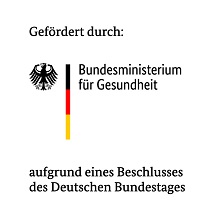Projects in the field of medical devices
BfArM is involved in national and European projects related to medical devices.
Current projects
Completed projects
KIMEDS
AI-assisted Certification of Medical Device Software
Improvement of incident reporting
In order to fulfill its regulatory tasks in medical device vigilance, BfArM needs a comprehensive and up-to-date overview of the risks associated with the use of medical devices. The primary source of corresponding information are reports of serious incidents according to Article 87 paragraph 1 of regulation (EU) 2017/745 (Medical Device Regulation, MDR) and Article 82 paragraph 1 of regulation (EU) 2017/746 (In-vitro-diagnostic device regulation, IVDR) by medical device manufacturers and reports of suspected serious incidents according to paragraph 3 of the German „Medizinprodukte-Anwendermelde- und Informationsverordnung (MPAMIV) by persons who professionally use or operate medical devices.
Reports issued by professional users (e.g. doctors, nurses) and operators (e.g. hospitals) are important for a variety of reasons. In practice, fewer than 10% of the cases submitted to the BfArM included direct reports by professional users or operators. Moreover, informal statements of users or user organisations reveal concerns regarding the legal reporting system which is suggestive of potential underreporting.
For this reason, BfArM's Medical Devices division implemented the project "Improving Incident Reporting", funded by the Federal Ministry of Health. Goal of this project was to increase healthcare professionals’ motivation to report incidents directly to BfArM, while ensuring high data quality of the reports at the same time.
Risk Reporting 4.0 - Piloting a reporting app
The reporting system for risk detection and assessment of so-called "serious incidents" in medical devices (e.g. implants, catheters) contributes significantly to the safety of medical devices in Germany and Europe. These incidents are events that occur with medical devices that are already on the market with regular CE marking and where a product defect is considered to be the cause of a death or a serious deterioration in the state of health of, for example, a patient. A particularly important reporting source of risk information are professional users and operators of medical devices, such as physicians and nurses in hospitals, because only professional users and operators can directly experience the relevant incidents and transmit essential information.
Incident reports are currently transmitted online to the Federal Institute for Drugs and Medical Devices (BfArM) using reporting forms. Using the new available mobile communication standard, the reporting system can be taken to the next level: Risk Reporting 4.0. In the project, the BfArM developed a reporting app for hospital employees that supports hospital-internal reporting processes. The core functionality is the supported creation of an incident report including additional multimedia information. Reports can be transmitted directly to the BfArM or are first forwarded to a hospital-internal central office.
The project was part of the joint project GIGA FOR HEALTH funded by the Ministry of Economic Affairs, Industry, Climate Action and Energy of the State of North Rhine-Westphalia, in which the first 5G-medical campus in Europe was developed at a university hospital.
Funding

RegCDx – Regulatory Research on Companion Diagnostics
Companion diagnostics (CDx) are diagnostic tests used to determine biomarkers that allow conclusions about the efficacy of a specific drug or an increased risk of serious adverse drug reactions. A test can only be defined as CDx if such a diagnostic procedure is mandatory for the therapy decision.
CDx belong to in vitro diagnostic medical devices (IVD) and are defined and explicitly mentioned in regulatory terms for the first time in regulation (EU) 2017/746 (IVDR), valid since May 26, 2022. Introduced are far-reaching regulations on information exchange that result from the above-mentioned novel dependence of the safe and effective use of certain medicinal products on the safety and performance of corresponding medical devices. At the same time, amendments to the national Medizinprodukterecht-Durchführungsgesetz (MPDG) came into force, which regulate and supplement the implementation of the IVDR in Germany. This changed many legal requirements and practical frameworks for placing on the market, approving and conducting performance studies, and assessing the risk associated with the use of the devices. The legal requirements for CDx require a close exchange between the experts of the authorities involved on the side of the medicinal product and IVD.
The German Federal Ministry of Health funded a project on "Regulatory Research on Companion Diagnostics". In the first project strand, BfArM's Medical Devices division identified content-related, organizational and process-related requirements for the exchange of information according to IVDR. The results were used to support the establishment of an information exchange between experts from BfArM, PEI and the IVDR implementation partners involved.
A second project strand (located in BfArM's Research Department) was concerned with gaining methodological competence through own investigations on high-throughput sequencing in ADR cases.
Funded by the German Federal Ministry of Health, grant no.: ZMVI1-2519FSB404.

